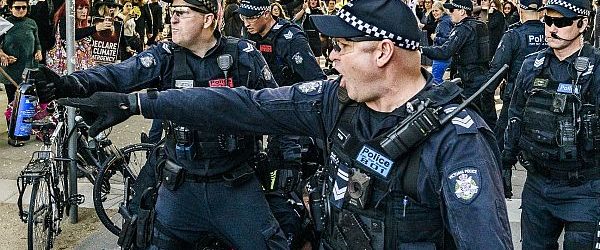The public reaction to last week’s murder of Eurydice Dixon, and the accompanying call for women to ‘take responsibility for their safety’, has been strong and swift.
Eurydice’s death is yet another tragic, pointless and catastrophic loss caused by yet another violent man. The outpouring of anger, fear and collective grief from women has been steady and predictable. So too has the steady and predictable stream of advice for women to ‘keep safe’, be vigilant and ‘take responsibility’ for their safety.
It is not the first time that police, and politicians, have offered this kind of advice. In 2015, after the killing of Melbourne teenager Masa Vukotic, Homicide squad chief Detective Inspector Mick Hughes said on national radio that ‘particularly females […] shouldn’t be alone in parks’.
In response to the number of reported sexual assaults spiking this year on the Gold Coast, police have advised women to ‘make decisions that make it more difficult to be preyed upon’ such as ‘perhaps be in groups’.
Currently the Queensland Police’s website has a whole page dedicated to personal safety advice for women, including recommendations such as ‘pay attention to your surroundings’ and ‘avoid being distracted by your mobile phone, keys and packages as you enter your car’, lock your car after you enter it, and tell a ‘responsible person’ when you plan to be home and how you plan to get there.
I don’t doubt that some of this advice is well intentioned.
Every time I chat to my mother, as I’m walking home and the sun hangs low in the sky or the moon has already risen, she insists on staying on the line until I arrive safely. Never mind the fact that she lives 2025 kilometres away, or that my home is far more likely, statistically speaking, to be more dangerous than the street.
And I don’t doubt that right now some of the advice that is being plastered across television screens and the internet is coming from a place of desperation – to do or say something in the face of an act of shattering public violence, that has left many shaken and afraid, and has sparked thousands to gather at park vigils around the country
This advice is not new or unique. It forms part of a broader ‘keep safe’ lie that is inculcated in women from birth and for generations has been passed like a lifeline from mothers and aunts to sisters and daughters. The problem is that the lifeline doesn’t work. All it does is rein women in and tie them down.
‘Text me when you’re on your way home.’
‘Text me when you get home.’
‘Call me when you’re walking home.’
‘Walk home with a friend.’
‘Who are you going out with? Will they walk home with you?’
‘Catch a cab.’
‘Don’t catch a cab alone.’
‘Have fun. Don’t stay out too late.’
‘Don’t drink too much.’
‘Watch your drink.’
‘Are you really going to wear that?’
And we internalise, regurgitate and perform these safety routines all the time, every day.
There is extensive research into the ‘safety practices’ of women. A 2015 study by The Australia Institute found that 87% of women had experienced some form of harassment in a public place, and that 40% reported feeling unsafe at times in public. I suspect it would be higher if women weren’t trained to conceal feelings of discomfort or fear to avoid being labelled hysterical, paranoid or distrusting (which is one of the many contradictions women are expected to internalise, given that the ‘keep safe’ lie depends upon women living in fear.)
The study also showed the lengths women go to in order to comply with the ‘keep safe’ lie: three in every five women reported that they had avoided walking alone at night and over a third held their keys in their hand like a weapon when they did walk alone.
It’s not just women, of course, who map their routes home or live with the fear of violence. A 2008 study of LGBT Victorians found that ‘nearly 85% of respondents had been subjected to some form of homophobic violence or harassment.’ Another 2010 study found that over 60% of young people surveyed had been subjected to verbal abuse because of their sexuality and almost 20% had experienced physical assault.
LGBTQ people reported very similar ‘keep safe’ strategies in an Australian Institute of Criminology survey into safety following public events like Mardi Gras: almost three-quarters of those surveyed reported changing their appearance to try and look more ‘heterosexual’. Over half made sure they travelled to and from Mardi Gras in a group.
Muslim women are another group frequently targeted in public – because of their gender, and also because of visible indicators of faith. Of the 243 incidents reported in the 2017 Islamophobia in Australia report where gender was known, over two-thirds of the victims were women.
Similarly to the internalised safety routines identified by the Australia Institute, the Islamic Women’s Welfare Council of Victoria found that ‘safety was prioritised above independence and wellbeing’. The report concluded that ‘Muslim women’s right to freedom of movement and independent living have been compromised. Muslim women no longer feel safe to travel alone.’
It is heart-shattering that we have created a society where if you are not white and heterosexual and male, you are taught to be afraid of the dark and to hide away for your own preservation.
Given the extensive evidence that women are already rigorously adhering to the ‘keep safe’ lie, it is unsurprising that there has been such an outcry in response to the Victorian Police’s calls for people to ‘take responsibility’ for their safety and to adopt ‘situational awareness’ when they’re out.
‘We are!’ women are yelling.
But more than just cries of ‘we are,’ a flurry of stories have been shared across the internet saying we are and it’s hurting us. We are and it doesn’t work. We are and we resent it.
The ‘keep safe’ lie only works by infecting women with fear – and that infection takes hold by convincing its host that if she shrinks small enough or hides away at night or speaks softly or smiles brightly then she will be safe.
There is no evidence that this is true, and it is not difficult to see how it may in fact have the opposite effect.
When we make people invisible, we leave a vacuum for others to fill.
If we force women off the streets, off the screens and off the stages and hide them away for their own safety, then we create even more space for straight, white men to occupy and to calcify their power. We need more visibility and public space for all women and communities pushed to the margins – not less.
To push back against the efforts to marginalise and silence is not easy, and it has real – and often detrimental – consequences for the people doing the pushing. As Hanif Kureishi wrote in The Guardian last week, ‘these men and their lackeys have been the beneficiaries of positive discrimination, to say the least, for centuries. The world has always been theirs, and they now believe they own it.’
To convince men that they are not the rightful owners of public space and the world as a whole would be to expose the entire capitalist hegemony in which we exist as a lie.
And so, instead of dismantling the idea that we can and should wield power over each other, that we can own people and their labor, that we have the right to subjugate one another, we instead tell all those who are denied a place in the upper echelons to be afraid of the dark.
Instead of demanding that men examine why they assume they have the right to speak first, or how they take up more than their fair share or what it means that they expect someone else to provide them with food and comfortable shelter, we tell women to ‘keep safe’.
The ‘keep safe’ lie also manipulates us into handing power over to institutions that both presently and historically are responsible for much of the violence perpetrated against members of our community. See how, after Meagher’s murder, Victoria pledged $3 million for more CCTV cameras, and pledges of increased surveillance even worked themselves into election campaigns with the promise that they would keep women safer.
The ‘keep safe’ lie disguises the perversity of giving more power to governments and their agents who already have unprecedented capacity to detain and question us, to surveil our actions on the internet and on the street, and who actively target, separate and detain the already marginalised.
While the data suggests men face a greater risk of physical assault by strangers than women, it is women who are ordered to modify their behaviour, to stay at home, to do and be less in public places. This is important because we do not see the police issuing public statements for young, white men to ‘keep safe’ when violent men punch strangers outside pubs. We don’t tell them to stay home or to dress differently or to text each other to confirm whether they have returned safe from a night out.
This is why the ‘keep safe’ lie is more than just condescending and ineffective. It actively harms women in precisely the way that it pretends to help: rather than keeping us safe, it keeps us silent. A world full of silent women is a world where men hold power over us – a dangerous world.
Eurydice Dixon didn’t die because she was out at night, or because she walked home alone, or because she was funny and brave on stage. She died because a violent man made a decision to end her life.
‘Keep safe’ only polices the behaviour of women. Keeps us quiet and indoors. Mutes our voices and limits our participation. The lie means there are fewer of us holding forth in public places and taking spots on public stages. It gives more room for men in our absence.
We should instead tell women to go forth and occupy – to be louder and more visible and more bold.
Reflecting on the ‘keep safe’ lie on The Project, Lisa Wilkinson said ‘the problem with giving this advice is that it keeps that one woman safe at the expense of all women’s right to move freely.’
Hiding us away doesn’t keep us safe, it just pushes us all further down.






